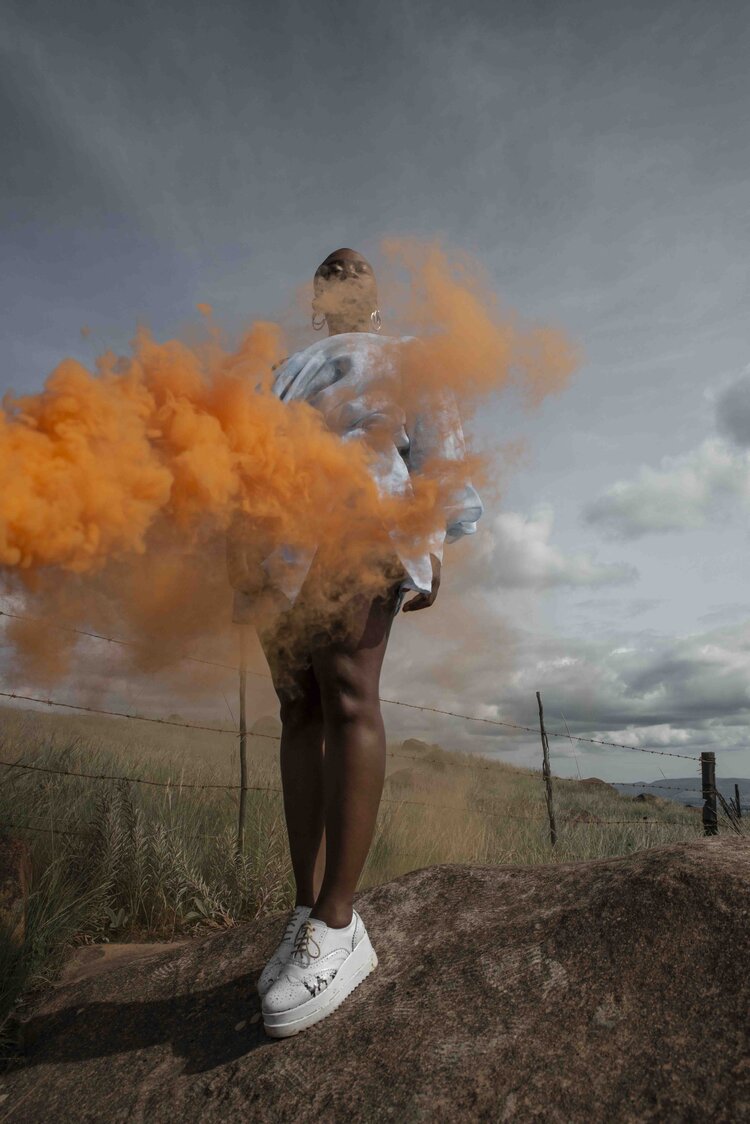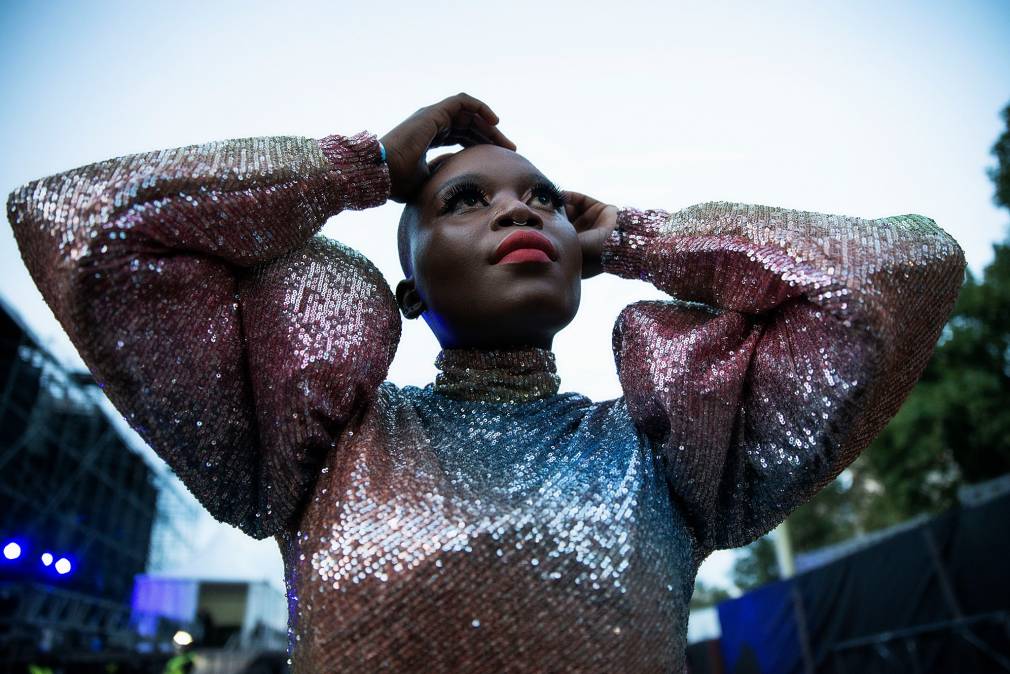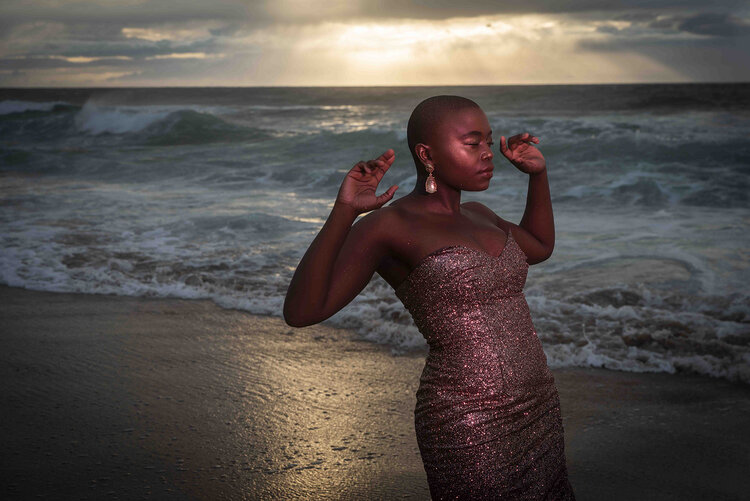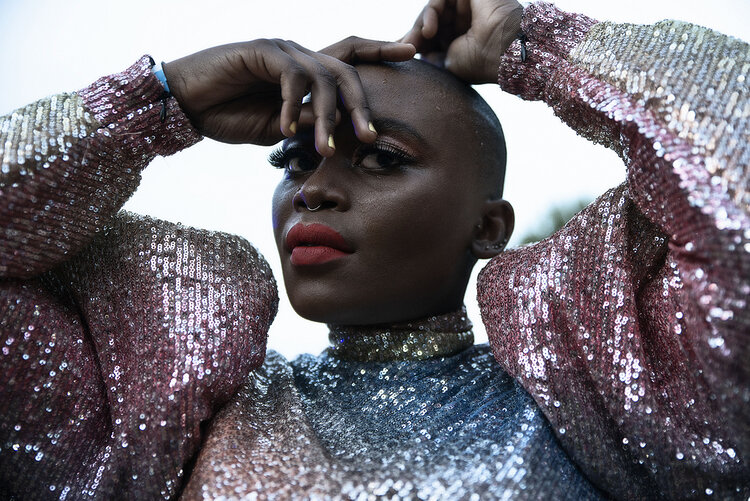Book-ended by two familiar sayings in the storytelling tradition of her people, Kwasukasukela and Cos Cos Yaphela, Zoë Modiga’s Inganekwane is the award-nominated world class musician’s latest project. We re-visit the award-nominated artist’s debut album, and examine how it links to her new body of work.
A few days prior to her career-defining performance at Afropunk Joburg in December 2019, Zoë Modiga assembled her crew of collaborators – fashion designer Neo Serati Mofammere, photographer Tatenda Chidora, and stylist Nthabiseng Molelebeli – and drove off to a farm located on the outskirts of Joburg to work on a new look which would serve as a point of departure from her previous work.
From late afternoon into the evening, the squad spent time designing different looks, documenting and posing for photos, and cheering for the wildly gifted and fiery performer, vocalist, composer, and spirit-woman.
There was an abundance of symbols associated with farm life: bellowing cows walked gingerly towards their evening hideout; the scent on the floors of expansive kraals evoked memories of a more ancient time; wild grass, and a generous amount of space from one house to the next, marked the horizon past which the orange sun rested its head for the night.
Her sophomore album, Inganekwane, is out on June 26th.
For nearly a decade, Zoë Modiga is a name that’s raised ears and elicited attention.
She appeared at The Mahogany Room, basking in the spotlight and stealing all the shine at the since closed down Cape Town music venue.
She popped up at a University of Cape Town student residential area, going back and forth on the mic with Titi Luzipo, led by frequent collaborator Ludwe Danxa and a band of fine tuned musicians.
Again she appeared as part of the Standard Bank National Youth Jazz Band at the Joy of Jazz festival in 2013, followed by a stellar debut showcase at the Cape Town International Jazz Festival in 2015, and a South African Music Rights Organization scholarship grant later that year.
Then, national glory, in the debut season of the award-winning musical competition show, The Voice, in 2016. She also recorded an album, and played it for an established record label, eventually rejecting their offer because they wanted to curtail her artistic direction…
Yellow: The Novel debuted in 2017. A triumphant record, the independently-funded, self-produced feat earned her two nominations at the South African Music Awards in 2018.
She tells journalist and thinker, Fezokuhle Mthonthi, that her stories aren’t told in orthodox ways. Those words encapsulate the essence of Yellow, a four-part novel whose chapters run the gamut of her influences – from fairy tales and limericks shared among her family members during festive gatherings; to kaleidoscopic, multi-genre poems about heartbreak, self-discovery, existential dread, and the Higher Power.
“Practically, [my stories] just aren’t verse, chorus, etc … To be able to exist in a space where everything is as it comes out of me is liberating,” she says.
She describes it thus: “Yellow is my favourite colour. It [symbolizes] happiness, caution, all the things that you kind of associate with [it]. And then ‘novel’ was the experience of a book. When you open a book, you dedicate time to it, and you spend time with just yourself and that particular book. And you read it, and you get into the story; you just allow yourself that journey and patience. I just really thought my work spoke to that solitary experience that you have.”
Besides setting the scene for an self affirming and continuous journey of self-discovery, the album changed lives. It endears her to new ears and ups the ante for musical excellence among her peers.
She still found time to work on other people’s projects amidst the fanfare including the multinational neo-soul quartet, Seba Kaapstad; Mandla Mlangeni’s Tune Recreation Committee; Ndabo Zulu’s Umgidi Ensebmble, and the Frank Paco Art Ensemble. Every line-up she’s on she ignites with ingrained charm which extends its embrace to everyone around her.
Zoë Modiga is an entire mood, an unhinged experience, and an exploratory enterprise.

Zoe makes time to answer some questions just before Tatenda picks up his Nikon cameras – one digital, the other manual – to produce magic through his disciplined command of the shutter button.
What have you been up to since Yellow?
I’ve been plagued with the question surrounding identity: What it means to be a woman, what it means to be black, what it means to be a storyteller. And it took me back to my grandmother’s place that I used to visit, and the idea of her laughing at me because I would stare at cows for long periods of time during the day. And I realize that identity is always something that has happened, that you need to look back at. I suppose this is me looking back, and being appreciative of where I come from, and what has brought me to where I am. And realizing that part of who I am is a story that needs to be told for people just like me, sing songs that are about people just like me, and realize that even that can relate to people who are really not like me, in many ways. This is a full circle.
You made us wait for a while before this new body of work. Why?
It made sense that people experienced [it] for two years. Yellow: The Novel was the biggest gift to me because there’s a song on there called “Inganekwane”, and inganekwane means fairytale in isiZulu. Just going back to myself being a storyteller, it was so important to tell stories for people like me, and touch on themes that relate to people like me. The new album is called Inganekwane. There’s themes that pertain to abantu abamnyama, black people; there’s themes that relate to knowing that something is within you. There’s themes that talk about our Creator, umdali wethu. There’s just themes that run through, very much like Yellow: The Novel, run through what human existence is, and what it looks like, but telling it through the perspective of the mother tongue. I think, as a people, the idea of language has been kind of played with and taken from us. Part of me having recorded this body of work allows me to claim the power of language back, and express through it; and also make my own understandings, because it’s a journey for me as well.
What are your thoughts regarding the word ‘brand’? Are you a brand?
I think brands are a business thing, but I think brands are [also] a personal thing. You sell yourself as a human being. If you’re kind to the next person, that’s your brand. As a performer, I [think of] myself as a brand. The things I do must make sense to my brand, or my understanding of what my brand is. And it’s always about the message of people, and speaking to our experiences. ‘Zoë’ means life. Apparently ‘Modiga’ means peace, hopefully, if my grandfather was telling me the truth. If that’s the case, then I suppose my purpose, in some sense, is for us a people to make peace with life and living. How do we go about doing that? Through just talking about what life is. You feel a lot better when you say to your friend ei, mngani wam, my life has been so many things that I don’t understand right now. And I wanted it to be that thing.

Inganekwane is not music for the scatterbrained. It grabs your earphones, sits you down, and demands your full attention. Produced by Banda Banda, it’s a leaner effort than its predecessor, yet possesses the same spirit of wonder that made the debut so special.
Banda Banda says, responding to the question about what his initial thoughts were going into this record, “The first thoughts were nerves because Zoë is such a world class artist, but I also trusted we would do something great. I kept my mind open.”
On the question of why she chose Banda Banda to produce, Zoë says that his vast knowledge of the African music landscape inspired her. She continues, “He has broken bread with so many greats and I craved that essence. I craved the history, the stories, the perspective. He has a deep love for our continent and people and I wanted that love to be very clear from the onset. I wanted us to create from that love so that whoever listening feels that intention.”
“Abantu”, which is the centrepiece, counterbalances the sublime second single “Umdali”, and is the closest thing to redemption listeners will find. The song speaks about the wretched state of black people, yet refuses to settle as its focal point. It’s a dream and a prayer. It’s a message of hope, a syllabus for spiritual foresight in a little over 5 minutes.
“Lengoma”, the lead single which features Urban Village’s Mpho Moloi, is upbeat and celebratory, designed to fit perfectly on daytime radio playlists. A simple refrain – thina, thina, siphilela lengoma; the lyrics lodge themselves inside your brain, and refuse to leave until you sing along and surrender to the groove.
“Uthando” is romance’s elder cousin, the realization of a love fulfilled outside mainstream norms. It’s seductive, sweet, and searching. On “Tata”, the wails are something strange yet so familiar. Zoe is expressive, or at least tries to be. But words fail. Instead, more wails, express a yearning and mournful longing for the undefined. Pianos, strings; it’s an orchestral leap and an emotionally draining wonder.
Flying low, but through the sky, black butterfly/ glad your wings know what to do, she sings on “Black Buttterfly”. You know where you belong, she continues; a letter to self, a reminder of one’s greatness and resolve to depart from a state of sadness towards one of exhilaration.
If “Abantu” is the centrepiece, and “Isegazini” its immediate cousin, then “Ilanga Lishonile” is the victorious breakthrough. Zoë’s choice pick from the Miriam Makeba songbook – the song appears on the revolutionary freedom fighter and musician’s album, Welela (1989) – is handled with the care it deserves. It feels right at home with her and through her.
There’s a lot of looking and digging deeper in order to pay homage and imagine another-future. One thinks of the great Busi Mhlongo, whose essence is beautifully channeled by Zoe, and about the urban Zulu’s less-mentioned, equally-important collaborator, Jabu Khanyile, also departed. There’s also a skit dedicated to the memory of the recently-departed artist and healer Credo Mutwa, and a host of other songs that are expeditions to unexplored and misunderstood territories and familiar memories.
The songs on Inganekwane are renaissance hymns. The world is listening. It’s Zoë Modiga’s time to fly.

